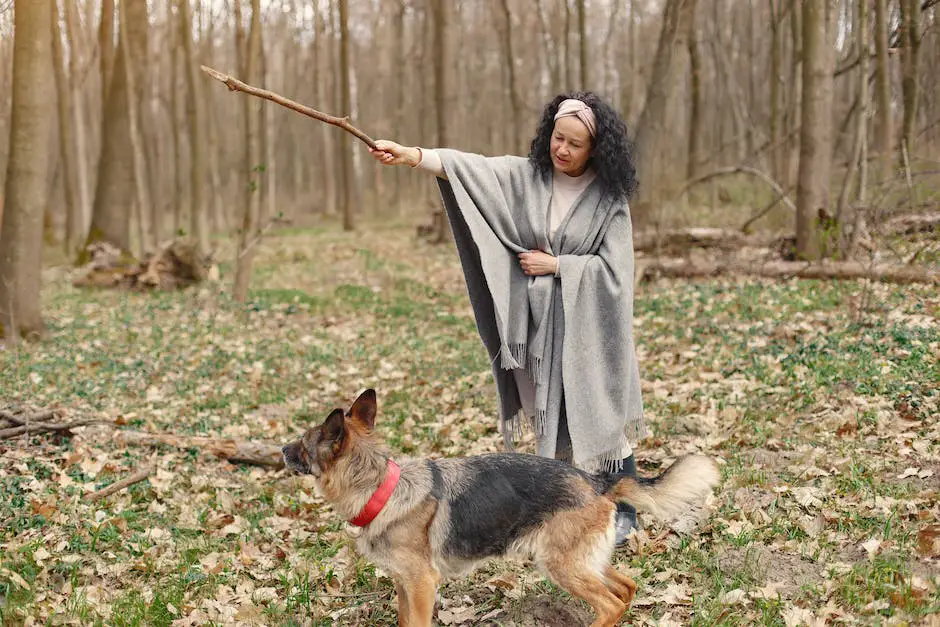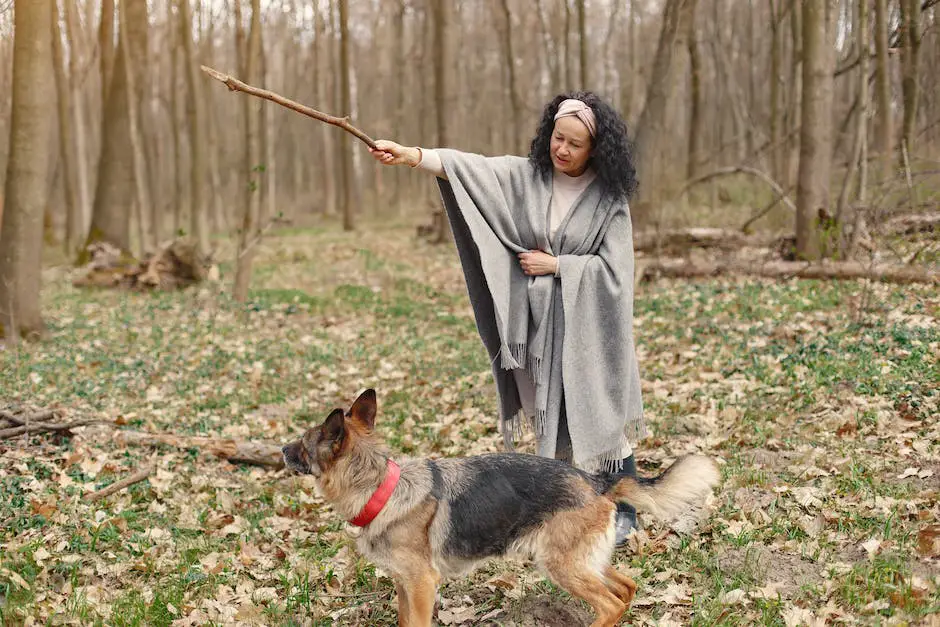German Shepherd puppies are an energetic and intelligent breed that need plenty of structure, socialization, and Training from an early age. An improperly trained German Shepherd puppy can become a nuisance, following its owner around obsessively, barking excessively, or even become aggressive.
There really is no single answer to this question since each dog is unique and will therefore require a slightly different approach to training. However, there are some general tips that can be followed when training German Shepherd puppies. First, it is important to be consistent with commands and rewards. This means that every time the puppy does something you approve of, they should be immediately rewarded with a treat or verbal praise. Second, it is helpful to use short, simple commands when first teaching the puppy. Once they have mastered these, you can gradually add in more difficult commands. Finally, it is important to be patient when training German Shepherd puppies, as they can be a bit stubborn at times.
Are German Shepherd puppies easy to train?
German Shepherds are one of the smartest and most obedient dog breeds, making them easy to train. They have the ability to learn quickly and retain lessons, which makes them ideal candidates for training. However, it is important to provide them with the right information and a risk-free environment in order to ensure success.
German Shepherds are intelligent and loyal dogs that make great companions and family pets. However, like all dogs, they need to be properly trained and disciplined in order to behave in an acceptable manner. Here are some helpful tips on how to discipline a German Shepherd:
1. Use distractions when your German Shepherd is in the middle of a bad behavior. For example, if they are barking excessively, try making a loud noise (such as clapping your hands) to startle them and redirect their attention.
2. Redirect their attention to a more desirable behavior. If they are chewing on something they shouldn’t be, offer them a chew toy to redirect their chewing behavior.
3. Reward positive behavior with treats, affection, games, or playtime. This will reinforce good behavior and help your German Shepherd understand what is expected of them.
4. Use short, but effective, calming timeouts. If your German Shepherd is exhibiting unacceptable behavior, remove them from the situation for a short period of time (no more than a few minutes) to calm down.
By following these tips, you can help discipline your German Shepherd and ensure that they grow up to be a well-behaved dog.
When should you start training a German Shepherd puppy
From 3 to 9 months, you can encourage your German Shepherd Dog’s best working traits with early and ongoing training. German Shepherds excel at obedience, so begin teaching your puppy basic commands like sit, down, and stay, as well as loose-leash walking, from an early age.
If your dog does not know simple commands, start with those. Use food, praise, and toys as motivators. The timing of the reward is extremely important. Treats should be small and tasty. Gradually, you will phase out any treat and do more praise reward as the dog gets more consistent.
Where should a puppy sleep first night?
It’s important to crate train your puppy from the start. On the first night, and for about three weeks, have the puppy sleep in a dog crate next to the bed. Line the base with blankets so that it is cosy and drape another blanket over the top to help it feel more secure. Give the puppy the stuffed toy that has its littermates’ scent on it to snuggle up to.
We would never recommend ignoring your puppy when they cry at night, especially in their first few nights. Ignoring them at night won’t help them build confidence and may make them worse which isn’t what anyone wants. They need to be taught how to be independent slowly.
What should German Shepherd puppies not do?
owners of German Shepherds must train their puppies not to bite, and be consistent with this rule. Chew toys can be used to provide an outlet for biting onto something acceptable. They also need plenty of chew toys to help with teething.
If you’re looking to build trust with a dog, it’s important to stay calm and avoid being too exuberant. Instead, respect their space and get on their level. Once they’re comfortable, let them come to you. A casual walk is a great way to get to know each other and build trust.
How do I train my German Shepherd puppy to walk beside me
Start inside the house and walk around a spacious room or up and down a hallway. Call your dog’s name and point to the side that you want him to walk on (whichever side you choose but left is in the traditional heel side). As soon as your dog comes alongside you, use a clicker or say “yes,” then reward.
McMillan uses 7 common commands to train dogs in a playful, positive, and kind way. These commands are SIT, STAY, DOWN, COME, OFF, HEEL, and NO. McMillan says that by using these commands in a positive way, dogs will learn to respond better to training.
How do you discipline a puppy?
1. Be consistent with your commands and enforce them evenly.
2. Be prompt in your responses to your puppy’s actions.
3. Be firm but gentle in your handling of your puppy.
4. Use positive reinforcement instead of punishment.
5. Timeouts can be effective in disciplining your puppy.
6. Avoid using physical punishment methods such as stare downs, dragging, or holding down.
7. Shouting or screaming at your puppy is ineffective and unnecessary.
German Shepherds can make great family dogs, but they often attach themselves to one person in the family. If you want your German Shepherd to be a good family dog, it’s important to provide leadership and guidance. Otherwise, they may display some unwanted behaviors.
Is it OK to leave a German Shepherd alone
Most German Shepherds will become bored if left alone for more than 8 hours a day. They are active dogs and need to have something to do. If they are left alone they may start to dig, chew and bark as they are bored. So it is best to not leave them alone for long periods of time.
German Shepherds typically reach puberty between the ages of 6 and 12 months, at which point they may start to exhibit more territorial and protective behaviors. This is a natural instinct for many dogs, and it is important to channel this energy in a positive way through training and socialization.
How do I calm my German Shepherd dog?
If your dog comes in contact with something that excites him, communicate calmly to your dog to keep him calm. Try to keep yourself calm as well, so your dog doesn’t pick up on your excitement.
If you’re bringing a new puppy home, it’s a good idea to spend the first few nights in the same room with them. This will help them adjust to being without their mother and will prevent them from waking up in a panic. Choose a quiet room where your puppy can feel comfortable and safe, and make sure to provide plenty of toys and chewables to keep them occupied.
Is it OK to sleep with your puppy
Sharing your bedroom with your dog may actually improve your sleep, according to recent research published by Mayo Clinic Proceedings. as long as he isn’t under the covers—may actually improve your sleep, according to recent research published by Mayo Clinic Proceedings26 1 2015.
If your puppy is crying during his first night home, there are a few things you can do to help stop the crying. One is to tire him out before bedtime by spending some extra time playing with him. You can also limit his food and water intake before bed to help prevent any accidents during the night. And finally, keep him close by your bed so he feels comfortable and secure. If the crying continues, try using some calming music to help soothe him.
Should you sleep in the same room as your puppy
There are pros and cons to having your dog sleep in your bedroom. Some people find it comforting to have their dog close by, while others prefer to have their dog sleep in another room. If you’re not sure what’s best for you, we recommend starting by having your puppy sleep in your bedroom in a dog bed or crate. This will help your puppy feel more reassured and comfortable.
Dogs can be afraid of the dark for a number of reasons. Most often, it is because they cannot see as well in the dark and may feel anxious or scared in unfamiliar surroundings. Additionally, some dogs may have had negative experiences in the dark, such as being startled by a noise or being attacked by another animal. If your dog is afraid of the dark, try to provide them with a safe, comfortable place to stay in a well-lit room. You can also help them feel more secure by staying with them and offering reassurance until they feel better.
Do puppies miss their mom
Sadly, there is not much you can do about a dog’s natural tendency to remember their mother and siblings. However, if you try to build up your dog’s bond with you, you will eventually become their new family. This means that while the memory of their previous family may remain, they won’t miss them as much.
One German Shepherd’s owners managed to catch his fear on camera. He was afraid of being left alone, afraid of the dark, the vacuum, other animals, etc. But his owners did their best to help him overcome his fears or at least manage them so they wouldn’t be a crippling source of anxiety.
What is the weakness of German Shepherd
As German Shepherds are prone to hind leg weakness, they are at an increased risk for severe arthritis. Dogs with bad hips and arthritic joints may change their gait and walk lower to the ground, causing German Shepherd legs to appear even more bent. This can make it very painful for them to move around and may cause them to suffer from mobility issues.
You shouldn’t allow your German Shepherd puppy, in the beginning, to sleep with you. The best practice is to put your German Shepherd in a cage or in the dog bed to sleep. Once your German Shepherd is fully potty-trained, sleeping soundly, and happily acclimated to its crate, you can let him sleep with you in your bed.
How do you tell if your dog is mad at you
Your dog may be annoyed with you for any number of reasons. If you’re constantly ignores or shunning them, they may feel neglected and become resentful. Alternatively, if you’re always doting on them and never give them any space, they may feel suffocated. Pay attention to your dog’s body language and try to identify any specific behaviors that may be causing them stress. If you can alleviate whatever is causing the problem, your dog will likely return to their usual happy self.
When greeting a dog, it is important to restrict your pats to the dog’s side, neck, back, or chest. Asking the owner if their dog has a favorite spot for petting is also a good idea.
How long does it take for a German Shepherd to get used to you
Here are some tips to help your new dog or puppy feel settled and safe in their new home:
– Make sure they have a comfortable place to sleep and spend time, away from any noise or busy areas in the home.
– Give them time to adjust – don’t try to force them to socialise or do things they’re not ready for.
– Avoid any big changes or upheaval in the home during those first few weeks, to help them feel secure.
– Be patient and understanding – they’re going through a lot of change and may act out of character or be anxious at times.
It’s not about competition, it’s about being a good leader for your pack. Teach your dogs to wait patiently and make the most of your time together. Practice commands regularly, but don’t give in to begging. Be consistent with commands, and never directly challenge your dog.
Final Words
If you are looking to train your German Shepherd puppy, there are a few things to keep in mind. First, German Shepherds are intelligent and eager to please, so training should be relatively easy. However, they can also be strong-willed, so be consistent and firm in your commands. Secondly, German Shepherds are working dogs, so they need plenty of exercise. A tired dog is a good dog, so make sure to give your pup plenty of opportunities to run and play. Lastly, German Shepherds are known for being loyal and protective, so socialization is important. Introduce your puppy to as many people, places, and things as possible to help them become a well-rounded dog.
If you want to train your German Shepherd Puppy effectively, you will need to invest time and patience. Like any other animal, puppies learn best with positive reinforcement such as treats, play, or petting. You should avoid using negative reinforcement such as scolding or hitting as this will only make your puppy scared or resentful. German Shepherds are smart and eager to please, so with consistent training, your puppy will be well on their way to becoming a well-behaved dog.






